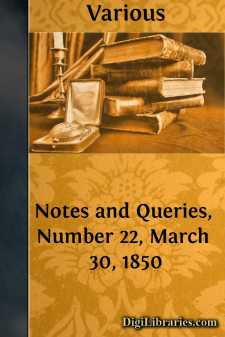Categories
- Antiques & Collectibles 13
- Architecture 36
- Art 48
- Bibles 22
- Biography & Autobiography 813
- Body, Mind & Spirit 142
- Business & Economics 28
- Children's Books 14
- Children's Fiction 11
- Computers 4
- Cooking 94
- Crafts & Hobbies 4
- Drama 346
- Education 46
- Family & Relationships 57
- Fiction 11829
- Games 19
- Gardening 17
- Health & Fitness 34
- History 1377
- House & Home 1
- Humor 147
- Juvenile Fiction 1873
- Juvenile Nonfiction 202
- Language Arts & Disciplines 88
- Law 16
- Literary Collections 686
- Literary Criticism 179
- Mathematics 13
- Medical 41
- Music 40
- Nature 179
- Non-Classifiable 1768
- Performing Arts 7
- Periodicals 1453
- Philosophy 64
- Photography 2
- Poetry 896
- Political Science 203
- Psychology 42
- Reference 154
- Religion 513
- Science 126
- Self-Help 84
- Social Science 81
- Sports & Recreation 34
- Study Aids 3
- Technology & Engineering 59
- Transportation 23
- Travel 463
- True Crime 29
Notes and Queries, Number 22, March 30, 1850
by: Various
Categories:
Description:
Excerpt
THE TAMING OF THE SHREW.
In two former communications on a subject incidental to that to which I now beg leave to call your attention, I hinted at a result far more important than the discovery of the author of the Taming of a Shrew. That result I lay before your readers, in stating that I think I can show grounds for the assertion that the Taming of the Shrew, by Shakspeare, is the original play; and that the Taming of a Shrew, by Marlowe or what other writer soever, is a later work, and an imitation. I must first, however, state, that having seen Mr. Dyce's edition of Marlowe, I find that this writer's claim to the latter work had already been advanced by an American gentleman, in a work so obvious for reference as Knight's Library Edition of Shakspeare. I was pretty well acquainted with the contents of Mr. Knight's first edition; and knowing that the subsequent work of Mr. Collier contained nothing bearing upon the point, I did not think of referring to an edition published, as I understood, rather for the variation of form than on account of the accumulation of new matter. Mr. Dyce appears to consider the passages cited as instances of imitation, and not proofs of the identity of the writer. His opinion is certainly entitled to great respect: yet it may, nevertheless, be remarked, first that the instance given, supposing Marlowe not to be the author, would be cases of theft rather than imitation, and which, done on so large a scale, would scarcely be confined to the works of one writer; and, secondly, that in original passages there are instances of an independence and vigour of thought equal to the best things that Marlowe ever wrote—a circumstance not to be reconciled with the former supposition. The following passage exhibits a freedom of thought more characteristic of this writer's reputation than are most of his known works:—
"And custom-free, you marchants shall commerce
And interchange the profits of your land,
Sending you gold for brasse, silver for lead,
Casses of silke for packes of wol and cloth,
To bind this friendship and confirme this league."
Six Old Plays, p. 204.
A short account of the process by which I came to a conclusion which, if established, must overthrow so many ingenious theories, will not, I trust, be uninteresting to your readers. In the relationship between these two plays there always seemed to be something which needed explanation. It was the only instance among the works of Shakspeare in which a direct copy, even to matters of detail, appeared to have been made; and, in spite of all attempts to gloss over and palliate, it was impossible to deny that an unblushing act of mere piracy seemed to have been committed, of which I never could bring myself to believe that Shakspeare had been guilty. The readiness to impute this act to him was to me but an instance of the unworthy manner in which he had almost universally been treated; and, without at the time having any suspicion of what I now take to be the fact, I determined, if possible, to find it out....












